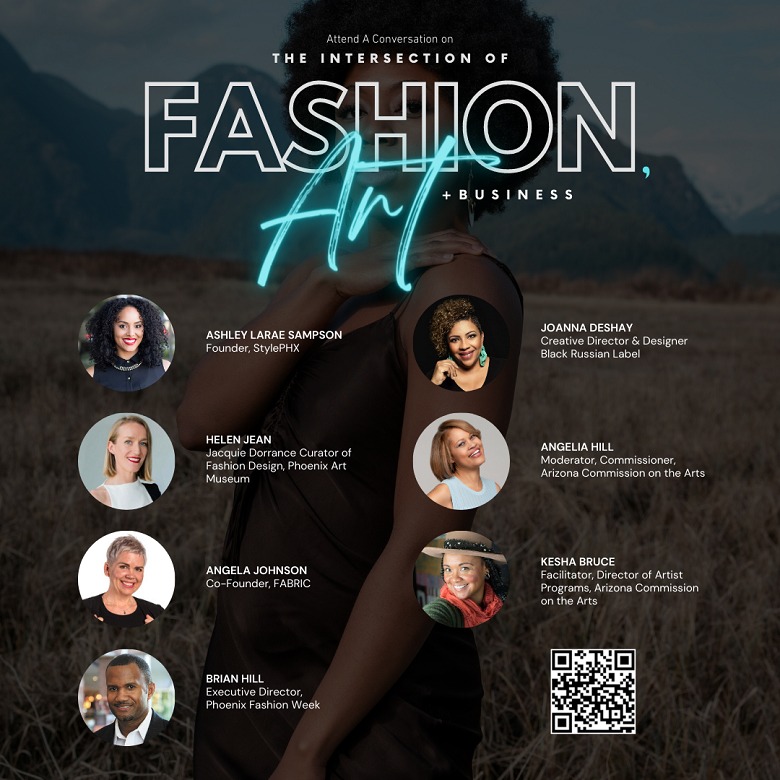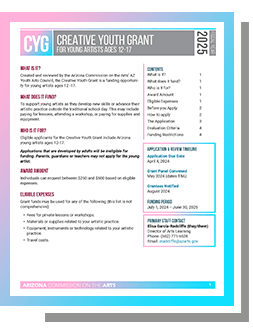The calendar below features upcoming Arts Commission deadlines, events, information sessions and workshop opportunities. Times, dates and event details may be subject to change. For more information, please email info@azarts.gov.
This is a public meeting.
This meeting will be broadcast live online at https://azarts.gov/panels/grant-review-panel-meeting/
Join us for a discussion focused on helping artists and other creatives better understand the connections between fine art, fashion and design. Panelists will share practical advice and strategies creative entrepreneurs need to succeed within the industry. Panelists will also highlight the specific opportunities, resources and funding currently available to Arizona artists.
Fashion Futures is hosted by StylePHX and One Million Entrepreneurs in partnership with the Arizona Commission on the Arts as part of the Artist Investment Program.
You can join the conversation in person or join our livestream from home. Click below to register:
Registration is free, but space is limited.

On Saturday, March 11, nine exceptional young people will compete for the opportunity to represent the State of Arizona at the Poetry Out Loud National Finals in Washington, DC, and a shot at the grand prize: a $20,000 college scholarship.
Live Webcast
1:00 pm, Saturday, March 11, 2023
Visit https://poetry.arizona.edu/poetry-out-loud for more information.
May 2 – May 4, 2023
9:00 am – 2:30 pm
The AZ Arts Learning Virtual Symposium provides professional development focused on trends and topics in arts learning. Designed to bring together Arizona’s arts learning community, the three-day virtual professional development will focus on sharing tools and resources to equip attendees with the inspiration and information they need to provide meaningful arts learning programing to diverse communities across Arizona. Join us as local teaching artists and arts organizations showcase the innovative work taking place across Arizona’s arts learning sector.
May 2 – May 4, 2023
9:00 am – 2:30 pm
The AZ Arts Learning Virtual Symposium provides professional development focused on trends and topics in arts learning. Designed to bring together Arizona’s arts learning community, the three-day virtual professional development will focus on sharing tools and resources to equip attendees with the inspiration and information they need to provide meaningful arts learning programing to diverse communities across Arizona. Join us as local teaching artists and arts organizations showcase the innovative work taking place across Arizona’s arts learning sector.
May 2 – May 4, 2023
9:00 am – 2:30 pm
The AZ Arts Learning Virtual Symposium provides professional development focused on trends and topics in arts learning. Designed to bring together Arizona’s arts learning community, the three-day virtual professional development will focus on sharing tools and resources to equip attendees with the inspiration and information they need to provide meaningful arts learning programing to diverse communities across Arizona. Join us as local teaching artists and arts organizations showcase the innovative work taking place across Arizona’s arts learning sector.
The Research & Development Grant will not be offered in Fiscal Year 2025 (July 1, 2024 – June 30, 2025) as the program undergoes planned periodic revision.
We are still offering Artist Opportunity Grants. Click here to learn more.
Research & Development (R&D) Grants provide funding support to Arizona artists as they work to advance their artistic practice, expand their creative horizons, and deepen the impact of their work.
This is a public meeting.
This meeting will be broadcast live online at https://azarts.gov/panels/grant-review-panel-meeting/
In January 2024, the Arizona Commission on the Arts will kick off its Sustaining Creative Aging in Southern Arizona initiative with a series of free introductory training sessions for aging or healthcare service organization staff, caregivers, volunteers, teaching artists, and arts organization administrators!
These sessions are offered free of charge, but registration is required. Click below to reserve your spot!
In January 2024, the Arizona Commission on the Arts will kick off its Sustaining Creative Aging in Southern Arizona initiative with a series of free introductory training sessions for aging or healthcare service organization staff, caregivers, volunteers, teaching artists, and arts organization administrators!
These sessions are offered free of charge, but registration is required. Click below to reserve your spot!
In January 2024, the Arizona Commission on the Arts will kick off its Sustaining Creative Aging in Southern Arizona initiative with a series of free introductory training sessions for aging or healthcare service organization staff, caregivers, volunteers, teaching artists, and arts organization administrators!
These sessions are offered free of charge, but registration is required. Click below to reserve your spot!
The application period for FY2025 Creative Youth Grants is now closed.
Created and reviewed by the Arizona Commission on the Arts’ AZ Youth Arts Council, the Creative Youth Grant is a funding opportunity for young artists ages 12 -17.
What does it fund?
To support young artists as they develop new skills or advance their artistic practice outside the traditional school day. This may include paying for lessons, attending a workshop, or paying for supplies and equipment.
Who is it for?
Eligible applicants for the Creative Youth Grant include Arizona young artists ages 12-17.
Applications that are developed by adults will be ineligible for funding. Parents, guardians or teachers may not apply for the young artist.
Award Amount
Individuals can request between $250 and $500 based on eligible expenses.
Grant funds may be used for any of the following (this list is not comprehensive):
- Fees for private lessons or workshops.
- Materials or supplies related to your artistic practice.
- Equipment, instruments or technology related to your artistic practice.
- Travel costs.
Applicants are encouraged to do the following prior to beginning their application:
Request Accommodations
If you require accommodation in completing the application, or otherwise participating in the grant application process, please contact the Director of Arts Learning, Elisa Radcliffe, by phone at (602) 771-6528 or by email at eradcliffe@azarts.gov.
Prepare Narrative Responses
You can type your proposal narrative, or you can upload audio or video recordings of your responses. The narrative has a maximum word count (not character) and a maximum recording length. If you share your proposal narrative in a video or audio recording keep it simple and to the point. The recording should be just you, describing your proposal and answering the questions listed above. Please do not include edits of your work samples or special effects. Production quality of this recording will not be considered in your review. Just make sure we can hear and understand you and keep editing and post-production embellishment to a minimum. All audio files must be uploaded as MP3 files (.mp3).
Narrative
(600 word limit, 5 minute audio/video limit)
Answer each of these questions.
- Tell us about yourself and your artistic practice.
- Describe how you will use the grant funds. Why are these activities or purchases important to you as a young artist?
- Provide a timeline of the proposed activities or purchases. All activities or purchases must take place July 1, 2024 through June 30, 2025.
Work Sample
Submit a work sample you’ve completed. All levels of artists are encouraged to apply. The panel will use the work sample to support the narrative you have provided. They will not be judging the quality of the work sample as a part of their review.
From the list below, please choose the most appropriate artistic work sample format to represent your discipline:
- 3 minutes of recorded audio
- 3 minutes of recorded video
- 6 images
- 3 pages of double-spaced text or 3 poems
Work Sample Narrative
(200 word limit, 2 minute audio/video limit)
Provide a brief description explaining how the submitted work sample relates to your proposal. Why did you choose them?
Budget
Expenses
List all expenses related to your proposal and provide a short explanation of the expenses.
Grant Amount Requested
Indicate the grant amount you are requesting, based on eligible expenses, between $250 and $500.
Budget Narrative (200 word limit, 2 minute audio/video limit)
If your total expenses exceed the grant amount requested, explain how you will pay for the remaining costs.
Your narrative responses will be evaluated by AZ Youth Arts Council members based on the following criteria.
Quality of Proposal
Did you clearly outline your artistic form and how you will spend the grant funds?
Potential Impact
Did you describe how these funds will impact you as a young artist?
Viability
Are the expenses you describe appropriate for the grant? Does the application demonstrate substantial evidence that the proposal will be realized within the proposed timeline?
- Food and beverages for any purpose.
- Fundraising projects.
- Opportunities that take place outside of the funding period.
- Equipment not related to the opportunity.
- Opportunities related to academic research or formal study toward an academic or professional degree, such as capstone projects.
- Applications that are developed by adults will be ineligible for funding.
- Grant administration, overhead or processing fees taken by an umbrella/parent organization as a percentage of the total award, with the exception of fiscal sponsors.
This list is not comprehensive.
Additionally, according to the Arts Commission’s enabling statutes, “Notwithstanding any other law, no monies from the Arizona Commission on the Arts may be spent for payment to any person or entity for use in desecrating, casting contempt on, mutilating, defacing, defiling, burning, trampling or otherwise dishonoring or causing to bring dishonor on religious objects, the flag of the United States or the flag of this state.” Recipients of Arts Commission support are further instructed to “take into consideration general standards of decency and respect for the diverse beliefs and values of the American public” within funded programs.




